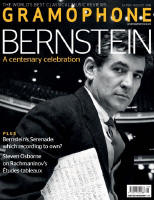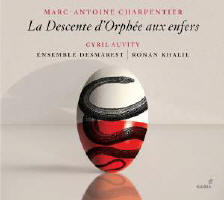Texte paru dans: / Appeared in: |
|
|
Outil de traduction (Très approximatif) |
|
|
Reviewer:
Lindsay Kemp The tone of the performance is set as early as the Ouverture, whose light and airy texture suggests that it is to be characterised by intimacy and delicacy by comparison with the slightly firmer Les Arts Florissants under William Christie and the heavier Boston Early Music Festival players (who use oboes instead of flutes) under Paul O’Dette and Stephen Stubbs. There is perhaps also a greater sense of ensemble involvement and enjoyment in the earlier scenes, symbolised by the sweetly tinkling harpsichords and enthusiastic strumming and drumming of the dances and interludes. But this piece must surely live or die by its Underworld scene, powerfully realised by Charpentier in a sequence of deepeningly ardent monologues for Orpheus in which the beauty of his singing is enriched by the irresistible seductive force of three bass viols. Khalil’s handling is passionate and convincing; but while Cyril Auvity’s clear high tenor certainly delivers the urgency of Orpheus’s complaints, the hard shallowing-out of his voice in his loudest outbursts can make them feel a little petulant. While more vivid than Aaron Sheehan’s Boston Orpheus, he cannot match Paul Agnew’s for Les Arts Florissants, which achieves a truly Orphic synthesis of persuasive insistence and vocal control that is hard to imagine surpassed. Christie’s overall handling of the drama, indeed, has a level of assurance few others can achieve, but there is life and commitment enough in Khalil’s to make it a version well worth hearing. |
|




